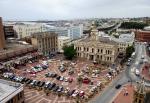Nelson Mandela Bay faces electricity tariff objection from Companies
 Named after the late South Africa's first black president Nelson Mandela, who died on Thursday, the Mandela Bay metropolitan municipality in Eastern Cape is facing objection from companies on the legitimacy of current municipal electricity tariffs.
Named after the late South Africa's first black president Nelson Mandela, who died on Thursday, the Mandela Bay metropolitan municipality in Eastern Cape is facing objection from companies on the legitimacy of current municipal electricity tariffs.
Named after the late South Africa's first black president Nelson Mandela, who died on Thursday December 2013, the Mandela Bay metropolitan municipality in Eastern Cape is facing objection from companies on the legitimacy of current municipal electricity tariffs.
The companies say the rates are nearly 35 percent higher than national power utility Eskom’s direct customer rates, which exclude the often heavy tariff premiums charged by municipalities.
They also say metros such as Durban, Cape Town and Tshwane have industrial tariffs "much closer" to the equivalent Eskom direct tariff.
The group includes metals foundries Autocast, Borbet and Weir Minerals, which serve the automotive, mining and general industries.
Automotive component suppliers and other companies are co-applicants‚ including Coca-Cola‚ Visteon‚ Johnson Controls‚ Natstan Wire and Crown Chickens.
The application‚ made at the end of October‚ is supported by the Nelson Mandela Bay Business Chamber‚ which is listed as a co-applicant against the National Energy Regulator of SA (Nersa)‚ Eskom‚ the municipality and Energy Minister Ben Martins.
Port Elizabeth is home to the Eastern Cape’s critical automotive industry, which benefits from world-class infrastructure that includes the deep-water port of the Coega Industrial Development Zone.
"National Treasury is really the guilty party as far as I am concerned," David Mertens, executive director of Autocast, said on Friday. "At the end of the day it is about taxes — and the Treasury has control over this."
The foundry produces engine components for Ford, Volkswagen and Toyota.
The litigants say there are more than 2000 different electricity tariffs throughout SA. Some companies are supplied by Eskom directly, but others receive their power from municipalities, which often add significantly to the Eskom tariff prescribed by Nersa.
"Although Nelson Mandela Bay is not the only municipality charging high tariffs, clearly it is possible to charge a more equitable tariff," Mertens said.
He said the group of about 20 litigants, including the business chamber, had tried to engage the municipality on electricity tariffs for the past two-and-a-half years.
The litigation comes as Eskom has asked key industrial customers to reduce their load by at least 10%. Mining companies used 14.5% of Eskom’s 2012 electricity sales, while heavy industry took up 26%.
The energy-intensive South African foundry sector, which serves both mining and industry, is in crisis for a variety of reasons. But much can be blamed on the soaring price of electricity.
In January, the business chamber "rejected" Eskom’s proposed third multi-year price determination for tariff increases of 16% each year over the next five years.
It said at the time that if Eskom’s application was approved, the region would "face a catastrophe" of job losses and the "downward spiral" of the provincial economy. Nersa eventually settled on an 8% increase for Eskom over the next five years.
Mertens was also working group leader on energy for the National Foundry Technology Network, an industry association initiative including the private sector and the Department of Trade and Industry.
This body made representations to Nersa, the South African Local Government Association and Parliament on the issue of municipal electricity rates.
"During a parliamentary hearing on electricity tariffs, Nersa recognised that there are structural and other problems with municipal tariffs and conceded that municipalities did not seem to understand the impact on industry," Mertens said.
Despite this. Nersa failed to deal with the problem during the 2013 tariff determination for Nelson Mandela Bay. he said.
"We are therefore left with no alternative but to turn to litigation to stop this factual taxation by the municipality on electricity charges."

















